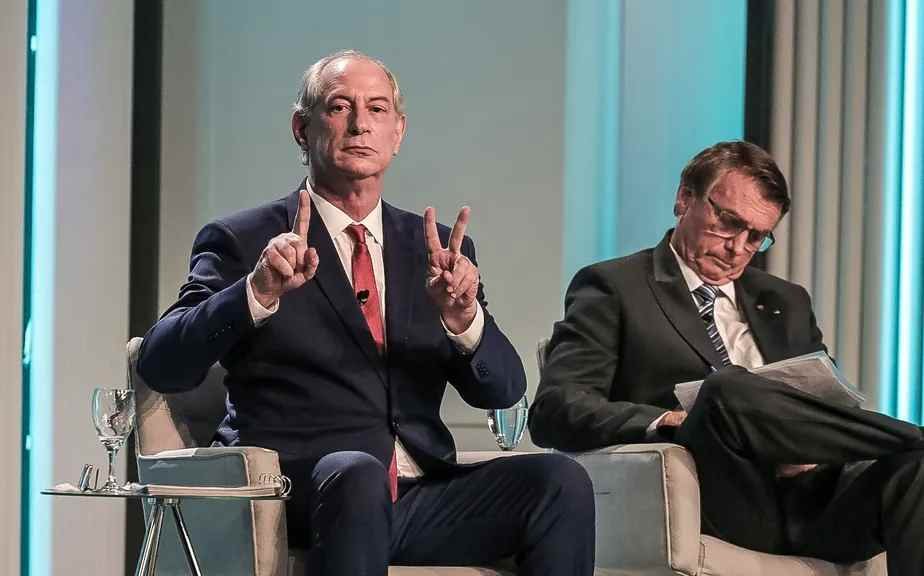
Os candidatos do PDT, Ciro Gomes, e do PL, o presidente Jair Bolsonaro, durante debate da TV Globo Reprodução/Twitter
Lula consolidates recovery in polls and widens lead.
Let’s start with a curious piece of data from the Genial/Quaest poll released today: Ciro Gomes achieved what seemed impossible and dropped to 0%. It’s true that this is not the intention to vote for the first round, but it is emblematic. When asked which name could replace Jair Bolsonaro, zero interviewees chose Ciro Gomes. As he positions himself as a radical opposition to Lula, his only space would be as Bolsonaro’s political heir. However, in this scenario, he plummets from an average of 8% to 12% in first-round vote intentions to 0%.
In other words, Ciro’s votes come from people who still see him as someone who could be supported by Lula – an impossible scenario. This means that his first-round percentages tend to migrate to the Workers’ Party candidate as the campaign intensifies. The data reveals the failure of Ciro’s anti-Workers’ Party strategy. Despite all efforts to occupy the right-wing space since 2022, he failed to establish himself as a viable alternative. His heinous attacks on Lula and the PT made him ill-regarded on the left, while he remains solemnly despised by the right (although his insults to Lula are instrumentalized by Bolsonarism).
His silence in the face of Trump’s attacks on Brazil has also caused some strangeness. It is a suspicious stance for someone who has always defended patriotism and nationalism – historical banners of the PDT, the party of which he is still national vice-president.
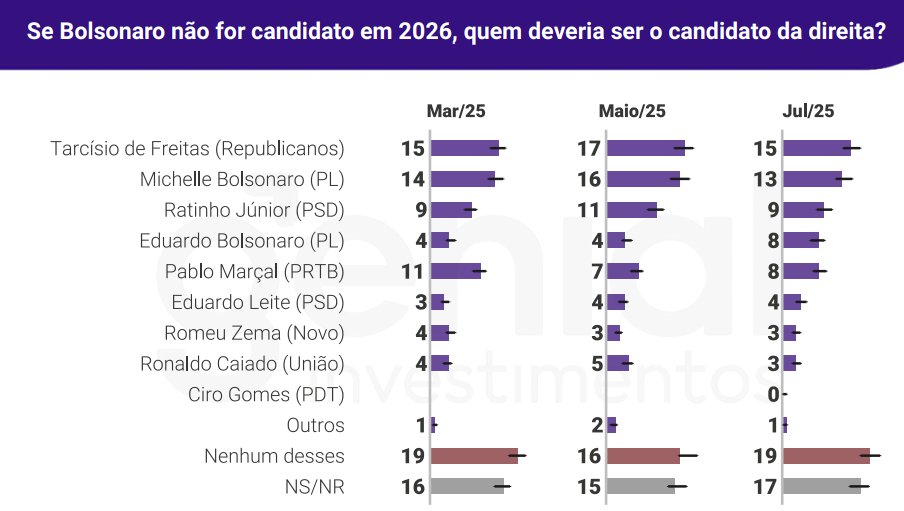
Lula’s consistent recovery
The Genial/Quaest poll confirms a trend we had already been observing in recent weeks: the tectonic plates of Brazilian politics have shifted.
The diplomatic crisis triggered by Trump and amplified by his allies in Brazil – Bolsonaro, Tarcísio de Freitas, and Romeu Zema – ended up delivering to Lula the most valuable of political gifts: the legitimate appropriation of the banner of nationalism and patriotism. This is a mobilizing force that transcends ideological divisions and even surpasses democratic appeal. The poll data confirms this turning point. Lula managed to position himself as the natural defender of Brazilian sovereignty, conquering political ground that will be extremely difficult for the right to regain.
In spontaneous vote intention, the upward trajectory is unequivocal: from 9% in March to 11% in May, reaching 15% in July – a six-percentage-point increase in just four months. To measure this performance, Bolsonaro registered an increase of only four points in the same period (from 7% to 11%), which means that Lula grew 50% more than his main adversary. The movement is repeated in the approval of the re-election candidacy, where Lula showed a remarkable recovery: he moved from the lowest point recorded in May (32%) to 38% in July, signaling a clear reversal of the trend.
The national question unified the left
The analysis by political positioning shows how the defense of sovereignty unified the entire left around Lula. When asked if Lula should run for re-election in 2026, the segment “Not a Lulista/Petista, but further to the left” had the largest growth: from 61% to 72% in two months. An eleven-point increase. The non-Lulista left, which had been distancing itself, returned to strongly support Lula’s candidacy.
Among Lulistas themselves, support for re-election grew from 84% to 90%. Even in the center and moderate right segments, Lula recorded small but consistent increases in the approval of his candidacy.
The defense of national sovereignty has proven capable of forming a broader and more cohesive political coalition than the democratic front of 2022. Unlike traditional ideological themes – which often divide more than unite – the patriotic issue emerges as a natural common denominator, transcending usual political and social cleavages.
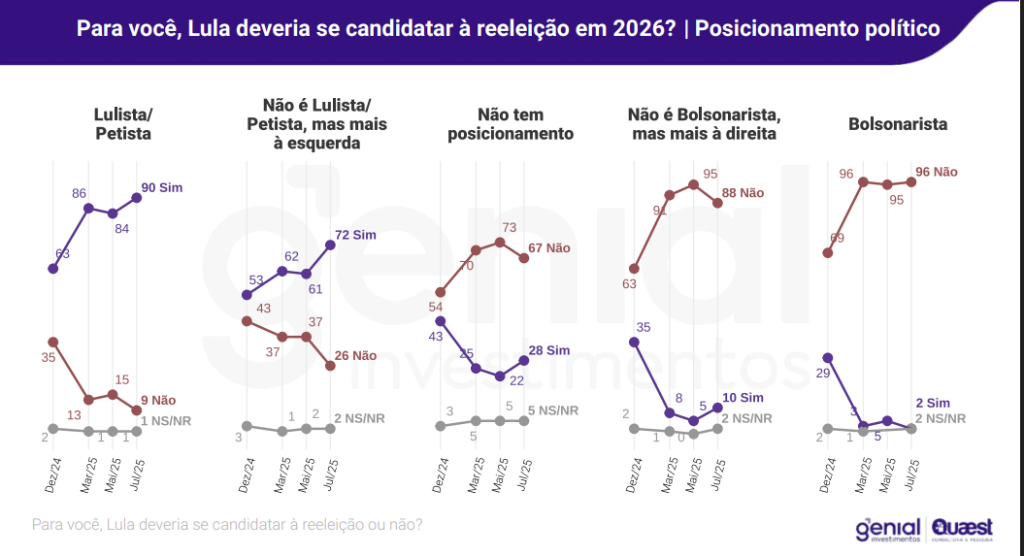
Electoral scenarios: Lula leads all simulations
In the stimulated first-round scenarios, Lula extended his lead in all simulations. Against Bolsonaro: 32% to 26%. Against Michelle Bolsonaro: 30% to 19%. Against Tarcísio: 32% to 15%.
In the second round, advantages vary between 5 and 10 points. Against Bolsonaro: 43% to 37%. Against other right-wing names, similar margins. There was also an increase in Lula’s advantage compared to previous polls. An important technical detail: undecided voters fell from 80% to 68% in the spontaneous poll. Lula was the one who captured most of these votes.
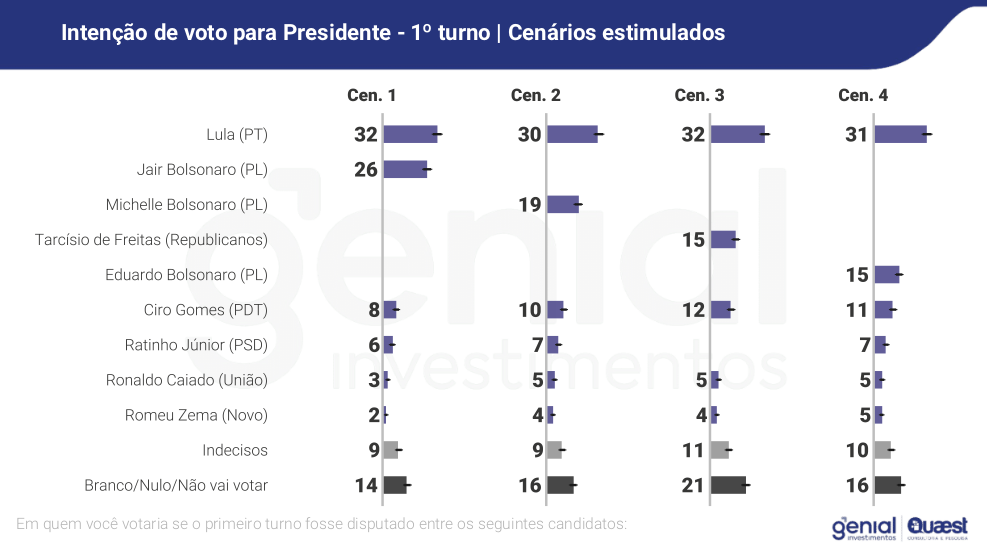
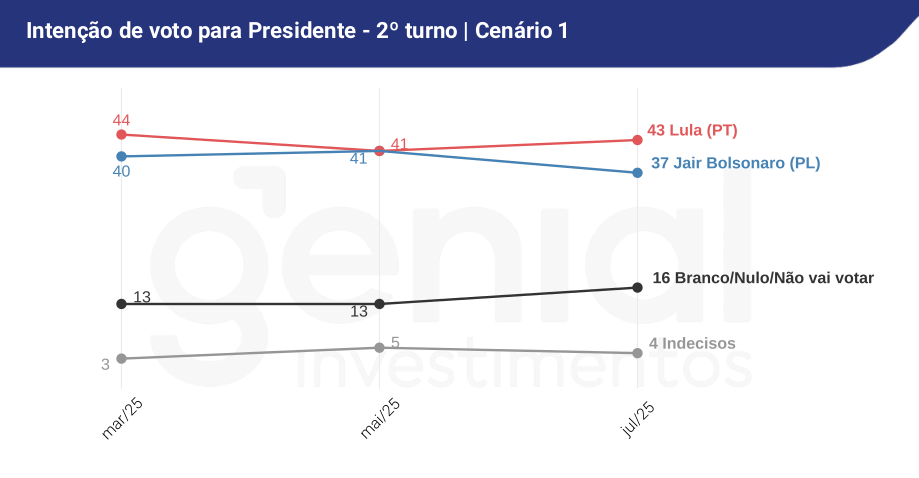
Tarcísio emerges as the main right-wing alternative
When asked about possible heirs to Bolsonaro on the right, interviewees pointed to Tarcísio de Freitas as the first option: 15% of mentions.
The governor of São Paulo appears ahead of Michelle Bolsonaro (13%) and Ratinho Júnior (9%), consolidating himself as the most viable name to succeed Bolsonarism. In first-round scenarios, Tarcísio registers 15% against Lula’s 32%. In the second round, the difference narrows: 37% against the president’s 41%.
This is Lula’s smallest advantage in any second-round scenario, indicating that Tarcísio could be the most competitive adversary in 2026.
Conclusions: the new political map of 2026
The Genial/Quaest poll captures a moment of inflection in Brazilian politics. The banner of patriotism, which had been falsely and deceptively appropriated by the Bolsonarist right, fell into Lula’s lap and generated a significant effect on his approval and vote intentions. This is reflected in all indicators of this and other recent polls.
On the opposition side, the scenario evolved from fragmentation to confusion. With Bolsonaro ineligible – a fact that deserves constant emphasis – the conservative field is still seeking to define its succession leadership. Tarcísio de Freitas, governor of São Paulo, emerges as the main alternative, but may opt for state re-election, leaving his presidential plans open. The other names considered, such as Michelle and Eduardo Bolsonaro, lack electoral depth and face the challenge of overcoming the perception of radicalism that limits their ability to form broader coalitions.
Although Lula leads all scenarios, 2026 will still be disputed. The margins in the second round are significant, but not definitive.
What this research makes clear: the national question changed the game, and Lula knew how to take advantage of it better than anyone else.
Research Methodology: The 15th round of the Genial Quaest survey was conducted between July 10 and 14, 2025, with 2,004 face-to-face interviews with Brazilians aged 16 or over. The margin of error is 2 percentage points up or down, with a 95% confidence level. The survey used data from IBGE PNADC 2025 – 1st quarter and Census 2022 as sources for sample composition.
Click here to download the complete survey.








